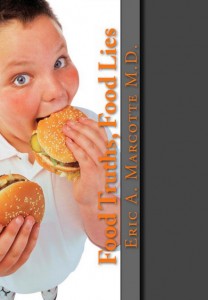Cartoon: Unintended Consequences Of Liposuction?


Women gain weight after marriage and men after divorce, especially among those over 30, likely the result of “weight shock” to people’s routines in physical activity and diet, sociologists reported.
The research, led by a sociology doctoral student at The Ohio State University, was presented at a roundtable on Marriage and Family at the annual meeting of the American Sociological Association. They used data from the National Longitudinal Survey of Youth ’79, a nationally representative sample of men and women ages 14 to 22 in 1979. The same people were surveyed every year up to 1994 and every other year since then, reported a press release.
Data on more than 10,000 people surveyed from 1986 to 2008 was used to determine Read more »
*This blog post was originally published at ACP Internist*
 Food Truths, Food Lies, written by family physician Eric Marcotte, M.D., may be the most refreshingly evidence-based diet book of the decade. You will not find a single mention of super-foods, magical berries, or supplement “must-haves” in the entire book. What you will find is the cold, hard truth about why many Americans are overweight, and what it takes to become a healthy eater.
Food Truths, Food Lies, written by family physician Eric Marcotte, M.D., may be the most refreshingly evidence-based diet book of the decade. You will not find a single mention of super-foods, magical berries, or supplement “must-haves” in the entire book. What you will find is the cold, hard truth about why many Americans are overweight, and what it takes to become a healthy eater.
Marcotte writes for the average American – his simple language, matter-of-fact tone, and regular reminders of what the reader has learned, make for a quick and memorable read. Although it’s clear that Marcotte has carefully distilled his dietary advice from the scientific literature, he refrains from burdening the reader with too many footnotes and references. Instead, he has created a kind of Cliff’s Notes of nutrition, having done the “heavy sifting” for us. What remains are the most basic principles underlying all healthy eating, such as:
*You can’t exercise your way to weight loss (i.e. you can’t outrun your own mouth – it’s much easier to eat more calories than you burn) Read more »
 I’m feeling rather nauseated today. This is my fifth day of a high-protein, low-fat, low-carb diet, and I have already developed a deep-seated hatred of egg whites. My regimen includes uncomfortable quantities of grilled chicken breast, fat-free cottage cheese, Greek yogurt, and egg protein, occasionally garnished with a lettuce leaf or perhaps a blueberry. Just yesterday I had to drink a plastic test tube of liquid protein to meet my goals (see offending product image to the left). It looked like a blood-tinged albumin sample, and tasted like orange flavor crystals with a splash of soy sauce.
I’m feeling rather nauseated today. This is my fifth day of a high-protein, low-fat, low-carb diet, and I have already developed a deep-seated hatred of egg whites. My regimen includes uncomfortable quantities of grilled chicken breast, fat-free cottage cheese, Greek yogurt, and egg protein, occasionally garnished with a lettuce leaf or perhaps a blueberry. Just yesterday I had to drink a plastic test tube of liquid protein to meet my goals (see offending product image to the left). It looked like a blood-tinged albumin sample, and tasted like orange flavor crystals with a splash of soy sauce.
I know that the scientific literature (if we distill it and perhaps oversimplify it a bit) seems to suggest that there may be a short-term advantage to high-protein diets in terms of weight loss, but that this advantage fades after a year. Yet almost every trainer and athlete I’ve encountered keeps telling me that the only way to get “really lean” is to eat unimaginable amounts of protein, avoid refined carbs, dramatically limit the complex carbs, and dial down the fat intake. Essentially, I must be reduced to swilling test tubes of orange-soy “albumin.”
When I strenuously protested the diet plan presented to me by my trainer, she simply said, “If you care what food tastes like then you’re not serious about losing fat.”
“Well how long do I need to consume 50% of my calories as protein?” I asked meekly, assuming that there would be an end point in sight. Read more »
Traditional brachioplasty surgery is performed through an incision (and leaves a scar) from the arm pit to the elbow. Care is taken to try to make the scar fall into a less often seen area when the arms are at the sides. The scars from surgery
*This blog post was originally published at Truth in Cosmetic Surgery*
It’s no secret that doctors are disappointed with the way that the U.S. healthcare system is evolving. Most feel helpless about improving their work conditions or solving technical problems in patient care. Fortunately one young medical student was undeterred by the mountain of disappointment carried by his senior clinician mentors…
I am proud to be a part of the American Resident Project an initiative that promotes the writing of medical students residents and new physicians as they explore ideas for transforming American health care delivery. I recently had the opportunity to interview three of the writing fellows about how to…
Book Review: Is Empathy Learned By Faking It Till It’s Real?

I m often asked to do book reviews on my blog and I rarely agree to them. This is because it takes me a long time to read a book and then if I don t enjoy it I figure the author would rather me remain silent than publish my…
The Spirit Of The Place: Samuel Shem’s New Book May Depress You

When I was in medical school I read Samuel Shem s House Of God as a right of passage. At the time I found it to be a cynical yet eerily accurate portrayal of the underbelly of academic medicine. I gained comfort from its gallows humor and it made me…
Eat To Save Your Life: Another Half-True Diet Book

I am hesitant to review diet books because they are so often a tangled mess of fact and fiction. Teasing out their truth from falsehood is about as exhausting as delousing a long-haired elementary school student. However after being approached by the authors’ PR agency with the promise of a…